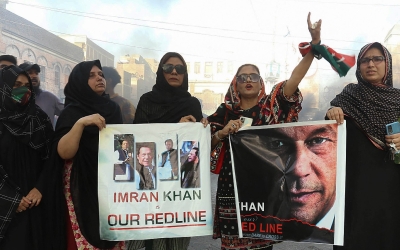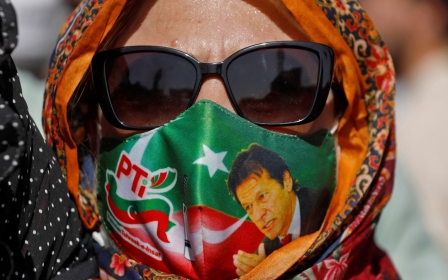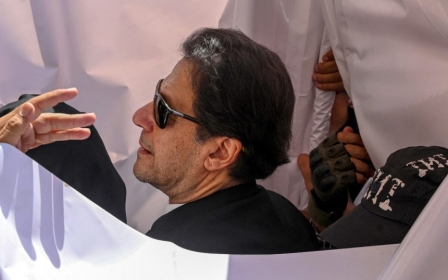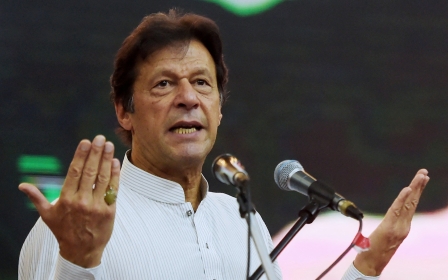How the Imran Khan saga could fundamentally alter the Pakistani state
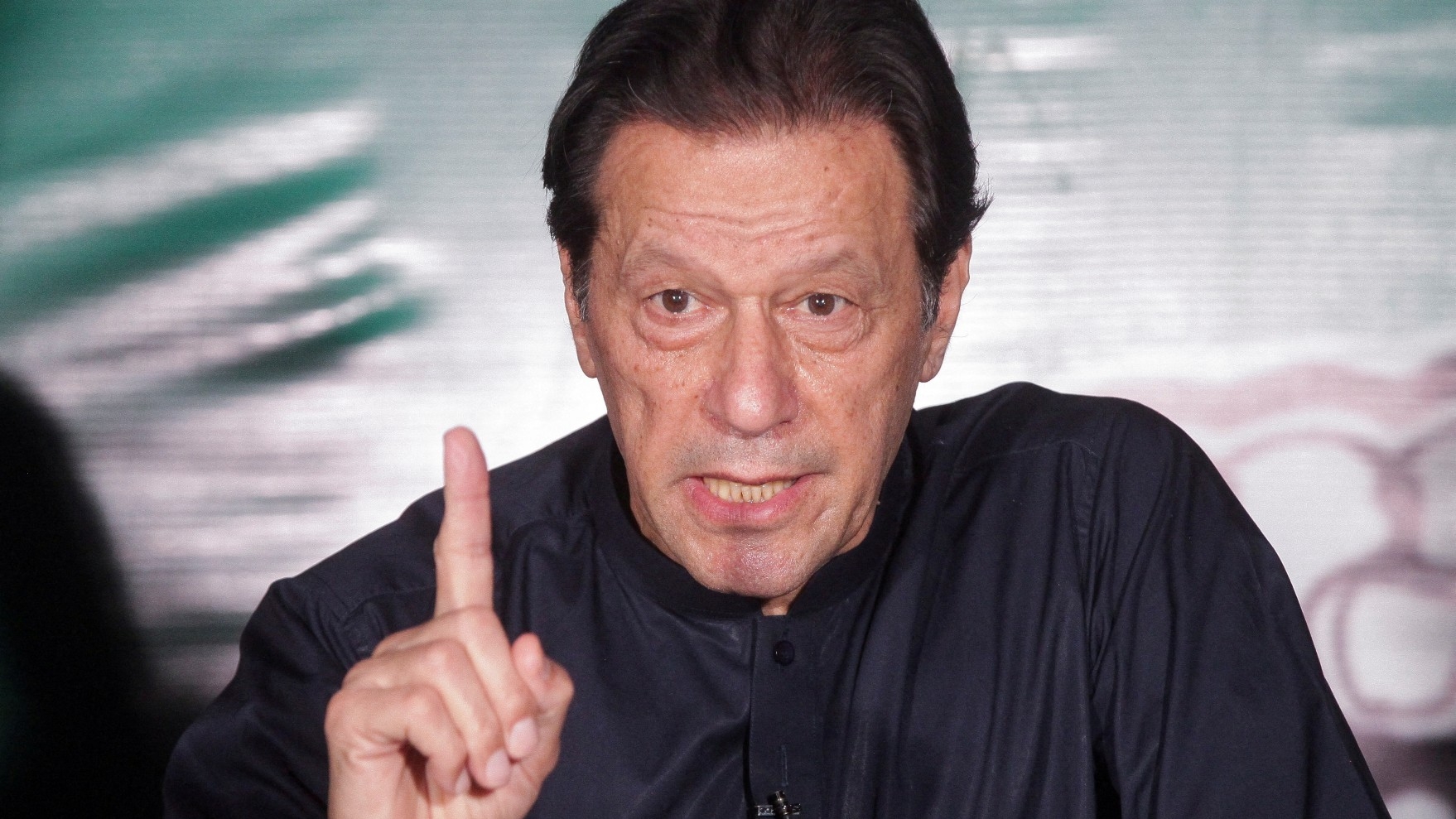
The unceremonious arrest last month of Pakistan’s former prime minister, Imran Khan, triggered a political firestorm as protests erupted across the country. Military facilities and installations were set ablaze and vandalised, and scores of protesters were killed or injured in clashes with security forces.
In the aftermath of Khan’s arrest, the battle lines have been clearly drawn, putting Pakistan’s powerful military into an open and decisive confrontation with Khan and his supporters.
Even before the events of 9 May, there was no love lost between Khan and the current leadership of Pakistan’s military. But under these circumstances, if Khan returns to power, it would have implications not only for the military leadership, but also for the institution’s symbolic power capital, which it has amassed over decades - including veto power over national security and foreign policy issues.
In short, such a development would fundamentally alter the praetorian character of the Pakistani state. While there might be differing opinions among the military’s top brass on the political competence of the current government, there appears to be unanimity on the dangers posed by Khan.
Unlike his political contemporaries, who are neither willing nor able to challenge the military’s dominance, Khan could potentially reverse the civil-military power hierarchy. His refusal to compromise through voluntary exile has cemented the military’s concerns about Khan.
New MEE newsletter: Jerusalem Dispatch
Sign up to get the latest insights and analysis on Israel-Palestine, alongside Turkey Unpacked and other MEE newsletters
Amid plans to put protesters accused of targeting military infrastructure on trial in military courts, it has become quite clear that the army will stop at nothing until it eradicates Khan from the country’s political spectrum.
But while the military has an upper hand in this power struggle as Khan’s political fortunes have plummeted, the odds are not stacked completely in the army’s favour. In the past, all coup regimes and military governments in Pakistan have received political and economic support from the West, owing to Pakistan’s unique geographical relevance against the Soviet Union.
Economic crisis
This strategy was critical to the survival of these military regimes, bringing cycles of economic boom, which thus made the rulers politically popular. This time around, however, the country is facing a debilitating economic crisis, and none of its traditional benefactors has been forthcoming.
With the International Monetary Fund not restarting its bailout programme for Pakistan, and foreign reserves reaching critically low levels, the country is at the edge of default. This economic predicament has become the military’s Achilles heel, and a formidable adversary - one even bigger than Khan.
On the political front, the military, in its bid to neutralise Khan, has further undermined the agency and reputation of its civilian partners in government, now largely considered as mere apparatchiks of the military.
This manoeuvring is meant to show Khan's party leadership that his demise is a fait accompli, and that they should save their own skins
It would not be wrong to argue that Khan’s removal from power ironically also gave him a political lifeline. Since his ouster, Khan has pushed a political discourse that has remained populist in its essence, successfully mobilising his political followers. Amid sky-high inflation, the abysmal performance of his successor, Prime Minister Shehbaz Sharif, in the economic realm has helped Khan to cement his political pole position.
This might not have been possible had Pakistan not undergone a demographic shift, with 64 percent of the country’s population below the age of 30. This is the demographic where Khan’s political message has resonated the most - or which, at least, remains oblivious to Pakistan’s family-oriented political parties.
The escalation in rural-to-urban migration, along with the rise of an educated and professional urban middle class, are also factors in Khan’s favour. For this demography, feudal politics holds no attraction. With the current economic rout hitting this group hard, they are naturally sticking with Khan. His voter base is not only intact, but growing.
This might have contributed to the decision to postpone provincial elections in Punjab and Khyber Pakhtunkhwa this year, and it may also lead to a similar postponement of general elections set for this October. This suggests that the crackdown against Khan and his party also has an electoral rationale.
But while Khan’s voter base might still be intact and committed, his party has its back against the wall, bearing the onslaught of the state’s wrath. Khan thus has very limited political instruments at his disposal to force an election and return to power.
Political engineering
Khan’s critical flaw, which has put him in this difficult situation, has been his failure to develop strong personal ties with the leaderships and political elites of key foreign states that have remained relevant to Pakistan’s political scene.
A good example of such dynamics is Khan’s arch-rival, former Prime Minister Nawaz Sharif, who was arrested after the military coup of 1999, but then pardoned and exiled upon the intervention of the Saudi royal family, with whom the Sharifs maintained close ties.
Furthermore, Khan’s visit to Russia on the eve of its Ukraine invasion increased his unpopularity within western capitals; thus, the military’s crackdown has not led to any repercussions from Washington and its allies, and it perhaps even happened with their tacit approval.
Indeed, the military has all but defeated Khan. As the state mulls a formal ban against his political party, his ability to mobilise and project power has been severely compromised. A new round of political engineering is underway, and a third column is emerging that could eventually be empowered through a “khaki election” like the one witnessed in 2002.
This manoeuvring is meant to show Khan’s party leadership that his demise is a fait accompli, and that they should save their own skins. In addition, the state’s focus on Khan’s party workers and pro-Khan civil society aims to de-politicise the middle class and youth who have refused to side with traditional, family-oriented political parties. This demography constitutes a long-term structural challenge to the praetorian nature of the state.
But Khan’s final political annihilation has been further complicated by the digitalisation of the public sphere and the advent of social media as an alternative platform to disseminate views and information.
Ultimately, the ongoing confrontation between Khan and the military will have a long-lasting impact on the structure and power balance of the Pakistani state.
The views expressed in this article belong to the authors and do not necessarily reflect the editorial policy of Middle East Eye.
Middle East Eye delivers independent and unrivalled coverage and analysis of the Middle East, North Africa and beyond. To learn more about republishing this content and the associated fees, please fill out this form. More about MEE can be found here.



